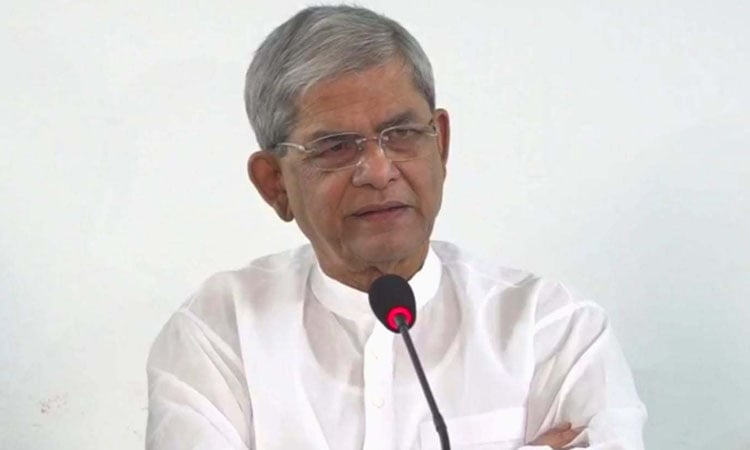Listen to the article
Fakhrul Warns of Attempts to Create Anarchy Through Social Media Propaganda
BNP Secretary General Mirza Fakhrul Islam Alamgir has raised concerns about ongoing efforts to destabilize Bangladesh through the spread of false information on social media platforms.
“The enemies of Bangladesh are rearing their heads again and starting to rise up,” Fakhrul told journalists on Saturday following a joint meeting with BNP-affiliated organizations at the party’s Naya Paltan headquarters in Dhaka. “As time passes, a malicious attempt is being made to create an anarchic situation in the country through the dissemination of false propaganda on social media.”
The meeting was convened to plan activities for the upcoming National Revolution and Solidarity Day on November 7, a historically significant date for the BNP that commemorates events from 1975.
During the press briefing, Fakhrul emphasized the contributions of the late President Ziaur Rahman to Bangladesh’s development and political landscape. He credited Zia with restoring multi-party democracy, ensuring press freedom, guaranteeing judicial independence, and establishing the Supreme Judicial Council.
“Ziaur Rahman was a rare statesman who initiated massive economic changes and gave momentum to the economy,” Fakhrul stated, highlighting the former president’s role in founding Bangladesh’s garment industry, which has since become the backbone of the country’s export economy. “He played a leading role in women’s education and empowerment and brought an unprecedented change in the field of education.”
The BNP leader also noted Zia’s agricultural reforms, including the introduction of high-yield crop varieties and improvements in fertilizer distribution to farmers, which helped modernize Bangladesh’s agricultural sector.
Drawing parallels to the present day, Fakhrul compared the leadership of Ziaur Rahman to that of his son, current BNP Acting Chairperson Tarique Rahman, and former Prime Minister Khaleda Zia. “Just as Shaheed President Ziaur Rahman united the nation, today Tarique Rahman is similarly working to unite the country. And just as Begum Khaleda Zia guided us in the anti-fascist movement, Tarique Rahman is now leading the party and inspiring the nation with new hope.”
Fakhrul announced a comprehensive 10-day program to mark National Revolution and Solidarity Day, running from November 5-13. The celebrations will begin with the hoisting of party flags at BNP offices nationwide on the morning of November 7, followed by floral tributes at Ziaur Rahman’s grave.
The main event will be a rally organized by Dhaka Metropolitan North and South BNP at the party’s central office in Naya Paltan at 3 PM on November 7, with similar gatherings planned across Bangladesh at district and upazila levels.
Various BNP-affiliated organizations will hold their own events throughout the period. These include discussions organized by Sramik Dal and Chhatra Dal on November 5, a photo exhibition at TSC on November 7-8, distribution of educational materials to orphaned students by Olama Dal on November 9, and discussions by Tati Dal and Krishak Dal on November 10 and 11 respectively. JASAS will host a cultural program at the Shaheed Minar on November 11 evening.
The celebrations will culminate with a major discussion meeting at the China-Bangladesh Friendship Conference Centre on November 12. The BNP will also release documentaries and photo collections across various media platforms between November 6 and 13, along with posters and special supplements commemorating the occasion.
The meeting saw participation from BNP senior leadership, including joint secretaries general, conveners and member secretaries from Dhaka Metropolitan North and South units, and leaders from various affiliated organizations.
Fakhrul’s comments come amid ongoing political tensions in Bangladesh, where social media has increasingly become a battleground for competing narratives between political forces.
Fact Checker
Verify the accuracy of this article using The Disinformation Commission analysis and real-time sources.




9 Comments
This is concerning news about the political situation in Bangladesh. It’s important to understand all perspectives and fact-check claims of propaganda or destabilization efforts. Promoting transparency and open dialogue is crucial for a healthy democracy.
I agree, verifying information and listening to different viewpoints is key. These are complex political issues that require nuanced analysis, not knee-jerk reactions.
While I understand the BNP’s concerns, accusations of ‘anarchy’ and ‘false propaganda’ should be scrutinized carefully. It’s important to uphold press freedom and allow open political discourse, even if critical of the government.
Good point. Healthy democracies must tolerate dissenting views and avoid cracking down on opposition voices, even if they are politically inconvenient.
Accusations of ‘false propaganda’ and ‘attempts to create anarchy’ are serious. The government and opposition should work to de-escalate tensions and ensure a free and fair political process, rather than trading inflammatory rhetoric.
Ziaur Rahman’s legacy is clearly still a major political issue in Bangladesh. It’s understandable that the BNP would want to commemorate his contributions, but the claims about his role should be examined objectively.
While I’m not familiar with the full context, I’m always cautious when politicians claim their opponents are spreading ‘false propaganda.’ That’s a common tactic to discredit criticism. Robust debate is healthy for democracy.
This is a complex issue with valid concerns on both sides. I hope the government and opposition in Bangladesh can find ways to engage constructively and address underlying problems, rather than resorting to inflammatory language.
This article raises important questions about the state of Bangladesh’s democracy and the role of social media in political discourse. I hope both sides can engage in constructive dialogue to address concerns and find common ground.